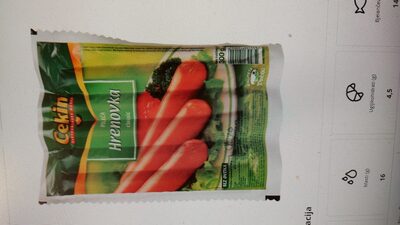cekin pileća hrenovka classic 300 g
This product page is not complete. You can help to complete it by editing it and adding more data from the photos we have, or by taking more photos using the app for Android or iPhone/iPad. Thank you!
×
Barcode: 850159120022
Categories: Meats and their products, Meats, Prepared meats, Sausages
Traceability code: HR 61 EU
Countries where sold: Croatia
Matching with your preferences
Environment
Packaging
Transportation
Report a problem
Data sources
Product added on by inf
Last edit of product page on by benbenben.
Product page also edited by roboto-app.
If the data is incomplete or incorrect, you can complete or correct it by editing this page.











